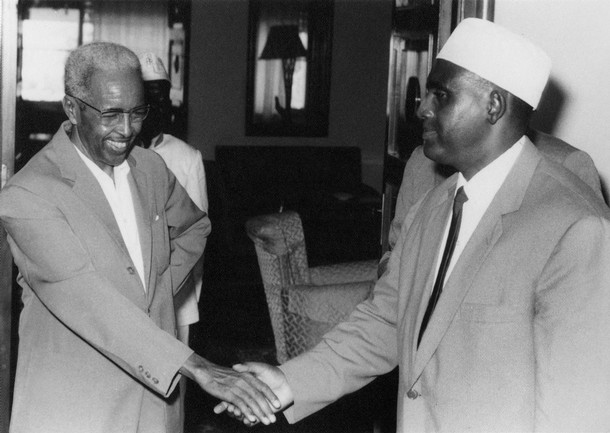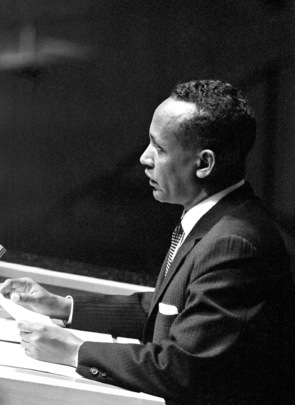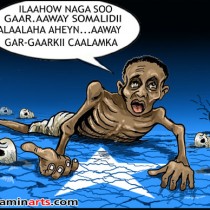
Somali Independence Week

Somali Prime Minister Abdurashid Ali Shermarke (R), and Somali President Aden Abdullah Osman Daar (L), shake hands 26 June 1960 in
Introduction
The idea of possible merger of the British and Italian Somalilands surfaced as early as 1959. In February of that year, British Colonial Secretary, Alan Lennox-Boyd, proposed while he was in Hargeysa that British Somalilanders have the option to choose between early self-Government and an early association with
By May of 1960, British Colonial Secretary, Ian Maclead officially stated that Britain was about to grant independence to Somaliland protectorate so that it can unite with Italian Somaliland (Somalia), which was scheduled to become a sovereign state on July 1, 1960. The Secretary made his announcement while Somaliland leaders were in
On April, 1960, the Legislative Council (in British Somaliland) passed a resolution, asking not only for independence but also to unite with
Again, on June 27, 1960, the Somaliland Legislative Council unanimously passed a bill that unites Somaliland with
The Joyous Friday –
On July 1, 1960, the 5-pointed white star flag was hoisted; and the next day, the union of the two Somalilands (British and Italian) was formally ratified by the National Assembly. Margery Perham of The Times has described the birth of the new Republic as Siamese twins whose god-parents were: the United Nations,
Still, Many Somalis seem to have plenty of reasons to be celebrating, this coming July 1st, for the Unification of the two Somalilands. For that reason, the Roobdoon Forum presents to its readership five-part Series of news coverage that relate to the
Part I
January 10, 1964

Foreign Minister of
Ethiopia and Kenya have moved fast to counteract Somalia`s military build-up. In December they ratified a mutual defence pact. (This came just after Somalia had turned down an offer of military aid to the tune of L6,4oo,ooo from the US, Germany and Italy in favour of one of Li 1-14 m. from the USSR.) Mr. Kenyatta was expected in Addis on Christmas Day to discuss joint measures of dealing with the Somali disturbances—but his flight was put off at the last minute. Instead, an Ethiopian military delegation arrived in
Meanwhile
1. The
2. Heat turned on the Somalis to try to get an assurance that the arms were to be used for defence purposes only and not against other African states.
In
Somalia`s Suitors
Africa Confidential, No. 3, pg.4
February 07, 1964
Chou En-lai was in
A correspondent in
Somalis hoped that China`s finger in the
For a start, the Russian aid programme is now going so well that they don`t want to become any more involved in the Sino-Russian dispute than they can avoid. Then too, they were reading foreign newspaper reports on Chou`s impending visit at least six weeks before the Chinese officially informed them it was going to take place. Furthermore, now that the flurry of excitement which accompanied the announcement of the aid agreements has died down, the Somalis realise that the Russians are doing more for them than the Chinese. Although Chinese experts are investigating possibilities, no concrete development projects have been agreed.
By contrast, the Russians are getting on well with their agricultural projects, and large quantities of machinery, including much-needed tractors, are arriving. Admittedly, few arms have yet arrived under the well-publicised £ 11-14 m. Russian military agreement of October, but go officers have been flown to
So the Russians now stand high in Somali estimation. They are also becoming more relaxed, unlike the cautious and reserved Chinese. They appear more in public, crack jokes and even, unknown perhaps to Somalis themselves, are realistic about local shortcomings. One Russian diplomat, asked by a Westernconfrère if he did not miss the many theatres of
However, the Russians, even in their new mood, fail to appreciate repeated Somali references to having sought Communist aid only because the West did not meet their demands. This is true;
From the African side the fears are all over possible Communist aid for the rebels in the Ogaden and the shifta in the NFD.* The Kenya-Ethiopia Defence Pact is but one reaction to this fear. But in fact for the Somalis this is a period of reflection. Now that
The coming General Election, slated for about March 15, may have something to do with this. In the municipal elections, the first of any kind since before independence, the Government won about 80 per cent of the seats. The opposition parties claim this was due to the high turnout of electors, for instance 96,000 votes were cast in one constituency of only 6,000 inhabitants and so on. Allowing for a similar degree of rigging in the General Election, they claim they will still get a significant number of seats, and with no nepotism would win. A realistic estimate is that the Government Somali Youth League party will win 70-80 seats of the total 123, the Somali National Congress (which recently merged with the United People`s Party) 30 or more, the Somali Democratic Union, 10. Three minor parties might get a seat each. Several of the present Ministers may not be returned at all. There was a proposal to introduce proportional representation in the North but this was defeated by Parliament just before it was dissolved on January 9. Despite the allegations of malpractice
Since then the Somalis have become more and more cynical about African unity, though the possibility that the new Government elected in March will decide to put the frontier disputes before the OAU cannot be ruled out.
In the meantime
* Kenya`s Northern Frontier District.
Leave a comment
| Copyright © 2009 - 2024 Sunatimes News Agency All Rights Reserved. |
| Home | About Us | Diinta | Reports | Latest News | Featured Items | Articles | Suna Radio | Suna TV | Contact Us |
 2
2 









Somali Independence Week
Compiled by: Roobdoon Forum